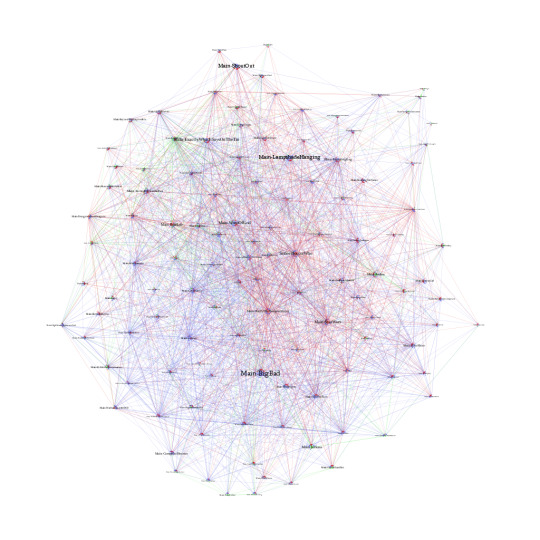#i feel like I have to specify q!bad specifically on this or people will twist it around and make it about meta stuff
Explore tagged Tumblr posts
Text
Interview with a TV Tropes contributor
This is a cleaned-up transcript, with spelling and punctuation polished and irrelevant side discussion edited out, of my interview with Miranda Garfinkle, an acquaintance of mine. I interviewed her through mushoku.tk, a website for text-based chatting.

My interviewee, as I interviewed her

My interviewee, as she appears in real life
Q: How did you first become aware of TV Tropes? How did you first become interested?
A: Oh man. I'm not sure I remember how I first became AWARE of it. I think what probably happened was I was looking up a show I'd finished, and the TVTropes link popped up front and center
Q: So, just sort of incidentally by random chance? By something unrelated, I mean?
A: I thiiiiiink so? Pretty sure nobody directed me to it or anything. After that it was pretty much a textbook rabbit hole. I really liked reading the example listings and finding new shows or comics that used tropes I liked by searching the examples on those trope pages. I also just really liked reading the trope descriptions and being like "Oh hey, I've seen this one! I know this one!" So that's what got me hooked, I guess.
Q: So what got you interested in contributing/editing?
A: It was pretty shallow - there were some tropes I recognized in shows I'd watched that didn't have the show listed in the example pages, so I made an account to add in the examples that were missing. It was fun recapping scenes I'd found awesome or compelling and getting across how cool they were, or how good of a trope execution it was.
Q: And in your experience, what sort of person is drawn to TV Tropes?
Hm... hard to say. I think there are a few groups. They're almost all fans of stuff, but that doesn't really narrow the demographic at all... You get some people who are hardcore fans of a handful of shows - the people who excitedly talk about plot twists and reveals with people who've never even heard of the shows before, because they just love discussing what made the show great. Those people show up to fill the example pages. Usually they give lurid descriptions, feature quotes from the example, etcetera. They're just there to have fun, pretty much. And I also think you get writers or aspiring writers, who tend to do more meta-analysis of the tropes and discuss variants and what exactly makes the tropes work or not work. They usually build up the trope description and debate what qualifies as a trope deserving of a page and somewhere in the middle you get people who just kinda go through and say "oh yeah <story> did this" and move on. But there's also a significant population who just reads tvtropes without adding to it. It's rather famously a huge timesink and it's weirdly easy to get lost in it for days at a time. I'm pretty sure a lot of people also jump in to add their favorite example/beef up the page for that story and squee about their fave part...yeah, I'm sure there's a large casual editor population.
Q: So would you say TV Tropes has changed how you look at fiction and media? For better or worse?
A: Hm. Well it definitely changed it, and I THINK it's for the better, but I do miss being surprised by simple plot twists. TV Tropes makes you really good at recognizing tropes in action but as a result you start developing an eye for troped-up plot twists and while it can be fun to be like "whoa yeah this part of the story WAS cool AND it's a trope with a million other examples that do the cool thing too!" after a while it turns into "oh hey they're doing this, neat." But at the same time I think it helped me figure out what parts of stories I actually liked, since I could specify like "I really like THIS SPECIFIC KIND OF TWIST ON THIS KIND OF CHARACTER." If anything I think the major thing TV Tropes helped me realize/internalize is that tropes and cliches really AREN'T inherently bad. It's really really easy to have a knee-jerk reaction to a trope showing up and just kind of dismiss the story for laziness but it's a lot more complicated than just "a cliche in your writing makes you a bad writer". As long as it makes sense and works and doesn't feel jarring a trope can be just as effective as an original twist, and in the process of striving for originality a lot of writers contort themselves in uncomfortable or unworkable directions just trying to play floor-is-lava with established literary devices. Anyway, yeah, TV Tropes definitely changed how I view stories and realizing that I didn't need an immediate scornful dismissiveness towards tropes was a big one for me at least.
Q: Do you find the specialized vocabulary of TV Tropes useful, even outside of TV Tropes?
Sometimes, yeah. I personally like using "Heel Face Turn" and "Face Heel Turn" to succinctly describe morality flips, and beyond that five man band, The Lancer, The Heart, Jerk with a Heart of Gold, etc - the specific character descriptors are very useful because otherwise they'd be kinda hard to succinctly encapsulate. And I personally really like "Planet of Hats" specifically because it sounds SO MENTAL but it's such a simple and yet hard-to-describe concept. But yes, the vocabulary of TV Tropes makes certain writing or analytical conversations a lot easier.
Q: Do you find it frustrating to communicate about storytelling to people who aren't familiar with the terminology?
Mm… occasionally, I guess, but I find generally we're discussing stuff that's either too specific or generally outside the scope of most trope names, or if I'm ranting about something I like I'll be going into a lot of detail anyway rather than aiming for efficiency, but sometimes it can be a bit annoying, like if I'm trying to say "this character is a Lancer" I don't wanna have to try and encapsulate that in more complicated terms.
Q: In your experience, does a lot of active discourse go on on the wiki, about how to build it, or is it mostly individual contributors working on their own and communicating when there's a conflict or a problem?
A:It seemed more like the latter to me, but that's mostly because I hardly ever participated in the discourse. Some pages have a lot of conversation behind the scenes, and apparently choice of example photo is hotly debated, but there's not much structure from what I saw.
Q: But there's communication/discourse going on?
Some, yeah.
Q: What things would you say are the biggest discourse magnets/generators?
I honestly don't know much about them. Like I said, I didn't participate, and they're fairly behind-the-scenes - some pages have attached "discussion" pages, but you never have to interact with them. The one time I went to one, it was because I noticed a picture I'd added had been changed back, and there was something of a "WHAT IDIOT PUT IN THE NEW PHOTO" shitstorm happening behind the scenes. Rather discouraged me from engaging, really.
Q: Okay, now if you had to sum up in one sentence the essence of what TV Tropes is about, or the essence of its mission, or fundamental conceptual basis, what would you say? Or not necessarily in one sentence, but in a nutshell, based on your experience.
A: Uh, hm. "An encyclopedia of notable storytelling tricks and trends."
Q: Would you say there's a fundamental premise or assumption that TV Tropes starts from or is based on?
A: Probably nothing more complex than "tropes exist."
Q: Nothing about what a trope is? Their definition of the word seems a tad specialized, given that the normal meaning as I understand it is something like "a figure of speech."
A: "Some story building-blocks show up a lot, let's talk about 'em"?
Q: So would you say "story building-blocks" is what they understand by "tropes"?
A: Well I think that's how they're defining it, in its simplest terms.
Q: And, fundamentally, why do you think people like TV Tropes? Or perhaps is there no single common motivation?
A: I think it's just… fun, in a very strange and hard-to-pin-down way. It lets you reminisce about the cool parts of stuff you liked, and it lets you break down what exactly was cool about those cool parts, and excitedly scream into the void about how cool those cool parts were… It's kind of like watching a "greatest hits" compilation of only shows you like.
Q: And as to why people get trapped for hours on end, any idea? Or is that just regular wikiwalkery? It seems like some wikis do that a lot more easily.
A: I think there's a lot less mental effort in a TV Tropes wikiwalk than in, say, a Wikipedia wikiwalk, since in the latter case you're potentially diving into really heavy, weird or just kind of arcane stuff. TV Tropes stays comfortable since it's all stuff we can recognize and kind of go "Oh yeah, this thing."
Addendum: An illustrative image, showing just .23 percent of the tropes, and giving an idea of just how interconnected they are. From this article.

From the same article, a map of TV Tropes as a whole, with colored regions being groups that are more densely interconnected with each other
0 notes